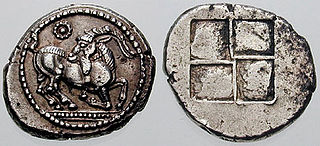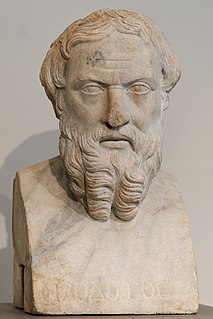
The Thracians were a group of Indo-European tribes inhabiting a large area in Eastern and Southeastern Europe. They spoke the Thracian language – a scarcely attested branch of the Indo-European language family. The study of Thracians and Thracian culture is known as Thracology.

Components of an electrical circuit or electronic circuit can be connected in series, parallel, or series-parallel. The two simplest of these are called series and parallel and occur frequently. Components connected in series are connected along a single conductive path, so the same current flows through all of the components but voltage is dropped (lost) across each of the resistances. In a series circuit, the sum of the voltages consumed by each individual resistance is equal to the source voltage. Components connected in parallel are connected along multiple paths so that the current can split up; the same voltage is applied to each component.
This gallery of sovereign state flags shows the flags of sovereign states that appear on the list of sovereign states. For other flags, please see flags of active autonomist and secessionist movements, flags of formerly independent states, and gallery of flags of dependent territories. Each flag is depicted as if the flagpole is positioned on the left of the flag, except for those of Iran, Iraq, and Saudi Arabia which are depicted with the hoist to the right.

Alcohol by volume is a standard measure of how much alcohol (ethanol) is contained in a given volume of an alcoholic beverage. It is defined as the number of millilitres (mL) of pure ethanol present in 100 mL of solution at 20 °C (68 °F). The number of millilitres of pure ethanol is the mass of the ethanol divided by its density at 20 °C, which is 0.78924 g/mL. The ABV standard is used worldwide. The International Organization of Legal Metrology has tables of density of water–ethanol mixtures at different concentrations and temperatures.
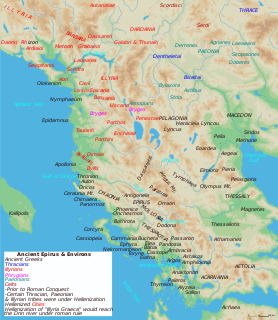
The Dardani, or Dardanians (Δαρδανίωνες) were an Indo-European tribe which settled in the region that took its name from them of Dardania, at the Thraco-Illyrian contact zone. Their identification as either an Illyrian or Thracian tribe is uncertain. They and their territory were by most writers not considered part of Illyria.
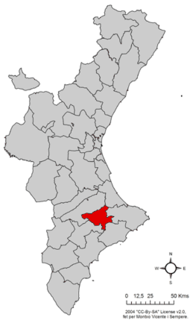
Comtat is a comarca in the province of Alicante, Valencian Community, Spain.

Aiani is a town and a former municipality in the Kozani regional unit, Macedonia, Greece. Since the 2011 local government reform it is part of the municipality Kozani, of which it is a municipal unit. The 2011 census recorded 2,006 residents in the village and 3,429 residents in municipal unit of Aiani. The municipal unit has an area of 156.004 km2, the community 52.336 km2.
Aeropus I of Macedon was the son of Philip I, the great-grandson of Perdiccas I, the first king of the ancient Greek kingdom of Macedon according to Herodotus, and the father of Alcetas.
Marie-Gaïané Mikaelian is a former professional tennis player from Switzerland. She turned pro in 2001 and won one singles title.

Kingdom of Dardania was an independent state in the Balkans during classical antiquity. Dardania was mostly populated by Dardanians (who were either an Illyrian or a Thracian tribe, or perhaps a mixture of the two; Thraco-Illyrian).

Këlcyrë is a town and a municipality in southern Albania, located on the bank of the river Vjosë. It was formed at the 2015 local government reform by the merger of the former municipalities Ballaban, Dishnicë, Këlcyrë and Sukë, that became municipal units. The seat of the municipality is the town Këlcyrë. The total population is 6,113, in a total area of 304.65 km2. The population of the former municipality at the 2011 census was 2,651. The Vjosë forms a canyon near the town, known as the Këlcyrë Gorge.
Philip I of Macedon was one of the early kings of Macedon, a kingdom of ancient Greece. He was a member of the Argead dynasty and son of Argaeus I, becoming king upon his father's death.
Alcetas I of Macedon was a son of Aeropus I of Macedon and the 8th king of the ancient Greek kingdom of Μacedon, counting from Karanus, and the 5th, counting from Perdiccas, reigning, according to Eusebius, 29 years. He was the father of Amyntas I, who reigned in the latter part of the 6th century BC.

Longarus was an Illyrian king of the Dardanian Kingdom. Longarus was at war with various Macedonian kings and managed to conquer at different times part of Macedonia. Longarus was an ally of the Paeonian State and liberated the Paeonians in order to open the routes towards Macedonia. Longarus' influence grew and many other Illyrians from the Ardiaean Kingdom joined him.

Dimale was an ancient town in Illyria, possibly situated in the territory of the Illyrian Parthini, east of the ancient Greek colony of Apollonia near modern Krotinë, Berat County, Albania. The city was of uncertain foundation, Greek or Illyrian.
Crateuas, also called Craterus (Κρατερός), was King of Macedon for four days in 399 BC. He was lover of Archelaus I of Macedon, whom he killed to become a king himself. According to another version, Crateuas killed the king because Archelaus had promised to give him one of his daughters in marriage, but later gave her to someone else. A third version asserts that Archelaus was unintentionally struck by Crateuas during a hunt. Crateuas was succeeded by Orestes and Aeropus II.
The Suram Fortress is a 1922 Soviet Georgian adventure film directed by Ivan Perestiani, based on Daniel Chonkadze's novel with the same title.
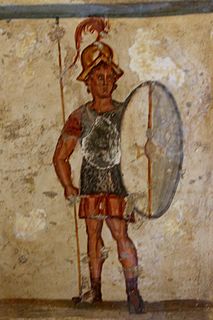
The Antigonid Macedonian army was the army that evolved from the ancient Greek kingdom of Macedonia in the period when it was ruled by the Antigonid dynasty from 276 BC to 168 BC. It was seen as one of the principal Hellenistic fighting forces until its ultimate defeat at Roman hands at the Battle of Pydna in 168 BC. However, there was a brief resurgence in 150-148 during the revolt of Andriscus, a supposed heir to Perseus.
Grabus was the king of the Grabaei, a minor tribe in Illyria, located somewhere in what is today the northern half of Albania.
